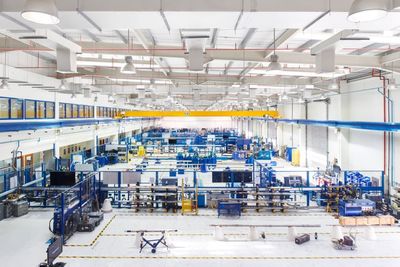
Houston-based energy technology company SLB has rolled out two new tools for the energy transition. Photo via slb.com
Houston-based energy technology company SLB has rolled out two new tools — one for evaluating sites for carbon capture, utilization, and storage (CCUS) and the other for measuring methane levels.
SLB (Schlumberger) says the screening and ranking technology can help developers pinpoint ideal CCUS locations during the site selection process. The company says this tool helps simplify “a complex and multifaceted process.”
“CCUS is one of the most immediate opportunities to reduce emissions, but it must scale up by 100 to 200 times in less than three decades to have the expected impact on global net zero ambitions,” says Frederik Majkut, senior vice president of carbon solutions at SLB. “Ensuring that a storage site is both safer and economical is crucial for the speed, scale, and investment needed to meaningfully drive CCUS growth for a low-carbon energy ecosystem.”
The tool crunches data to identify the potential capabilities, economic viability, and risks of developing a CCUS project. The technology already has been used in Trinidad and Tobago, a two-island Caribbean country, to screen and rank possible CCUS sites.
“Using industry-leading and proprietary technologies and workflows, we provide a consistent and reliable method for screening and ranking potential storage sites, including an assessment of the risk, to ensure economic feasibility and long-term reliability,” SLB says on its website.
SLB unveiled the technology at the ADIPEC energy conference in the United Arab Emirates.
Prospective sites for CCUS projects include oil reservoirs, gas reservoirs, salt caves, and shale formations. More than 500 CCUS projects are in various stages of development around the world, according to the International Energy Agency.
Texas is poised to become a major player in the CCUS movement, with Houston set to serve as a hub for CCUS activity. Next March, Houston is hosting a major CCUS conference at the George R. Brown Convention Center. Sponsors of the event are the Society of Petroleum Engineers, American Association of Petroleum Geologists, and Society of Exploration Geophysicists.
The other tool released by SLB measures methane levels. Specifically, it’s a self-installed methane monitoring system that relies on sensors to detect, locate and assess emissions across oil and gas operations. Methane represents about half of the emissions from these operations.
“The technology automates continuous methane monitoring — eliminating the need for manual data collection during typical intermittent site visits, which only offers producers a small sample of their emissions,” says SLB.